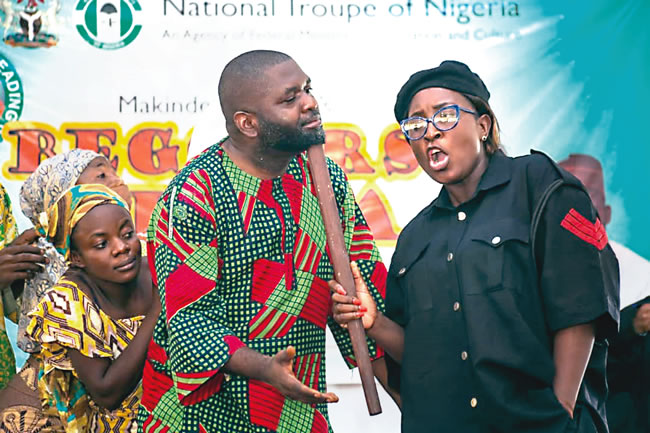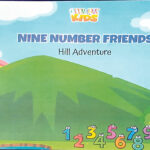After a five-year hiatus, the play reading session of the National Troupe of Nigeria returned with Makinde Adeniran’s ‘Beggars’ Opera’ highlighting the disunity among the oppressed who continue to suffer the tyranny of a few.
It was a quality audience at the 32nd Play Reading Session of the National Troupe of Nigeria (NTN) on Thursday, April 13, at the National Theatre Marquee, Iganmu, Lagos. The session featured open reading and dramatising excerpts from Makinde Adeniran’s ‘Beggars’ Opera’.
Unsurprisingly, the gathering had playwrights including Professor Tunji Azeez of the Theatre Arts Department, Lagos State University, who chaired the event; Drs Tunji Sotimirin and Cornel Onyekaba, President, National Association of Nigerian Theatre Arts Practitioners (NANTAP), Israel Eboh, Mufu Onifade, Segun Adefila, Dr Shaibu Hussein and Pamela Udoka and featured a lively discussion.
‘Beggars’ Opera’ sees several beggars in the evenings on a patch between a highway and the sea where they sleep. They narrate events at locations they went to beg and express their frustrations and pains. They must unite and fight to overcome their oppressors, including police officers who constantly raid their place.
Welcoming guests after an opening excerpt from the play, the Artistic Director/Chief Executive Officer of the National Troupe, Ahmed Mohammed Ahmed, explained that the session’s purpose was manifold — celebrating playwrights, who are often unsung and promoting playwriting and development through critical analysis.
Ahmed said, “We always pay attention to talents – dancers, musicians and actors – but not to producers. The Troupe took it upon itself to encourage the development of playwriting. One thing about the session is that sometimes, we find a play that has been corrected after reading. The National Troupe will then get a sponsor to produce the play. We come, read the play and critique it for the playwright to make necessary adjustments while we look for sponsors, especially as the National Theater is being renovated. It will be inaugurated soon, and we must put plays on stage.”
Characters of the 77-page play were assigned to guests at the event after that. After guests finished reading the first two parts, the National Troupe returned to perform another excerpt before the last part and discussion.
Assumed by some to be a musical because of the rich music content, the playwright explained that ‘Beggars’ Opera’ is a drama with music.
“The ‘Opera’ in the title is a metaphor, chronicling the irony of the Nigerian masses during the time. As it were, the masses want the same good life in governance, but they fight for it in different ways. Sometimes, their struggles in a different direction for good governance become very toxic that they destroy themselves. Then, the oppressors continue in their stead, and the masses continue in their confusion. The situation has become a repeated melody in the masses’ lives: beggars’ opera.”
Giving a background to the play featuring several Yoruba songs Adeniran, the Secretary General of NANTAP, said it was from his exile experience with Professor Wole Soyinka and others.
“I was the youngest. I didn’t plan it, but they took me along by mistake. I went to perform a play and ended up as one of those who could not return home with Uncle Tunji Oyelana and others. I write most of my play as an intervention. As I see them, I write and walk away because the moment I have done that, I have rid myself of a burden. I was caught up in that confusion. I saw Wole Soyinka, Gani Fawehinmi and others rushing everywhere, fighting. I just saw all of us as beggars. I lived through that moment and decided to collect the experiences in a play. This play is my account of being the smallest among them, and I depicted those at the forefront through the characters in the play.”
The dramatist and broadcaster whose writing credits include ‘Abiku’ (an adaptation of Ben Okri’s ‘The Famished Road’, ‘Agbara’, ‘Sodom’ and ‘Kolombia’ ‘Alamori’ (the play that represented Nigeria in the Cairo International Experimental Theatre Festival 2005); ‘Small Boy’ (an award-winning movie) and several other HIV/AIDS drama skits for the BBC, appreciated guests for gracing the event. “I am grateful for the community of the people here,” he said.
Commenting on the playwright’s choice of background and setting, Professor Azeez said no creative should be afraid to tell their stories. “As a writer, we must always tell our story how we want. Of course, every story must have a setting and all other technical details, but we must tell the story as it comes to our brain because it is ours.”
The National Troupe of Nigeria’s Play Reading Session started in 2001 to encourage creativity and excellence in the performing arts. It had not happened in five years before this last edition.
READ ALSO FROM NIGERIAN TRIBUNE
WATCH TOP VIDEOS FROM NIGERIAN TRIBUNE TV
- Let’s Talk About SELF-AWARENESS
- Is Your Confidence Mistaken for Pride? Let’s talk about it
- Is Etiquette About Perfection…Or Just Not Being Rude?
- Top Psychologist Reveal 3 Signs You’re Struggling With Imposter Syndrome
- Do You Pick Up Work-Related Calls at Midnight or Never? Let’s Talk About Boundaries







